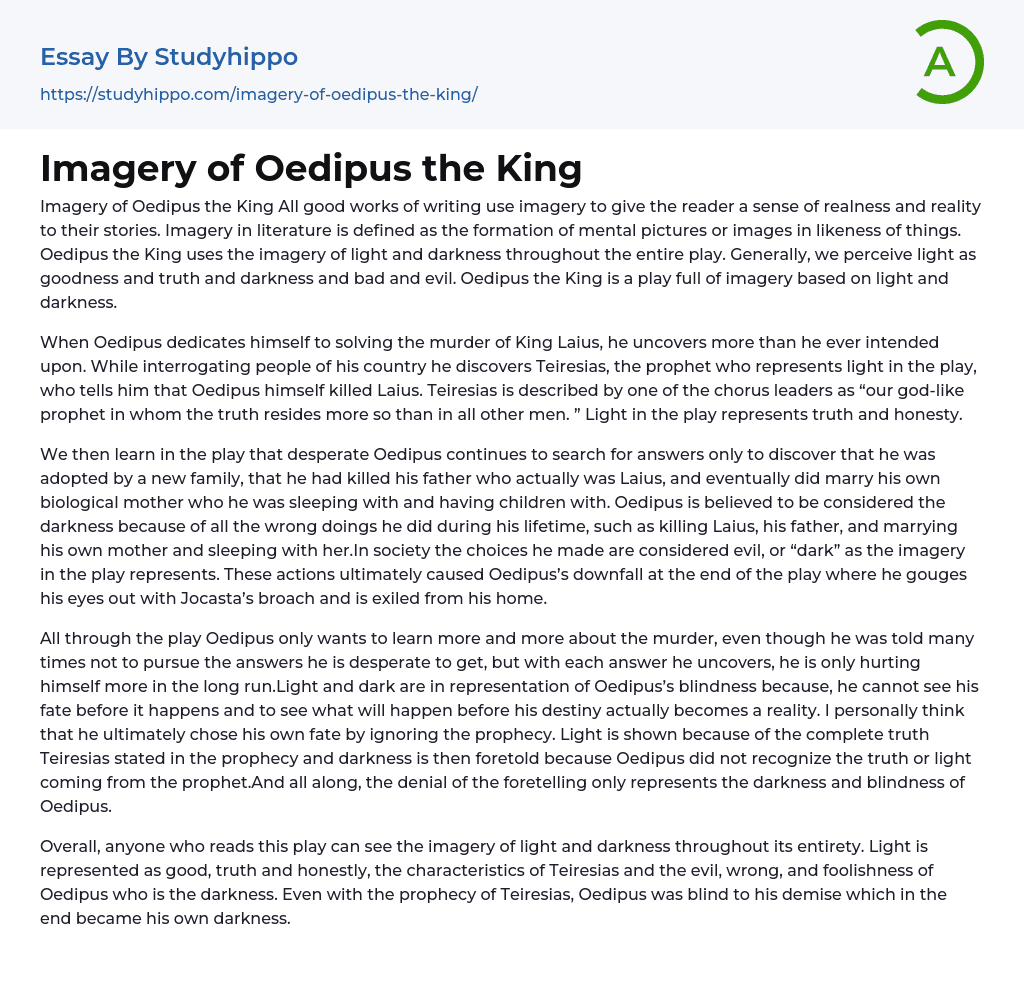Imagery of Oedipus the King All good works of writing use imagery to give the reader a sense of realness and reality to their stories. Imagery in literature is defined as the formation of mental pictures or images in likeness of things. Oedipus the King uses the imagery of light and darkness throughout the entire play. Generally, we perceive light as goodness and truth and darkness and bad and evil. Oedipus the King is a play full of imagery based on light and darkness.
When Oedipus dedicates himself to solving the murder of King Laius, he uncovers more than he ever intended upon. While interrogating people of his country he discovers Teiresias, the prophet who represents light in the play, who tells him that Oedipus himself killed Laius. Teiresias is described by one of the chorus leaders
...as “our god-like prophet in whom the truth resides more so than in all other men. ” Light in the play represents truth and honesty.
We then learn in the play that desperate Oedipus continues to search for answers only to discover that he was adopted by a new family, that he had killed his father who actually was Laius, and eventually did marry his own biological mother who he was sleeping with and having children with. Oedipus is believed to be considered the darkness because of all the wrong doings he did during his lifetime, such as killing Laius, his father, and marrying his own mother and sleeping with her.In society the choices he made are considered evil, or “dark” as the imagery in the play represents. These actions ultimately caused Oedipus’s downfall at the end of the play
where he gouges his eyes out with Jocasta’s broach and is exiled from his home.
All through the play Oedipus only wants to learn more and more about the murder, even though he was told many times not to pursue the answers he is desperate to get, but with each answer he uncovers, he is only hurting himself more in the long run.Light and dark are in representation of Oedipus’s blindness because, he cannot see his fate before it happens and to see what will happen before his destiny actually becomes a reality. I personally think that he ultimately chose his own fate by ignoring the prophecy. Light is shown because of the complete truth Teiresias stated in the prophecy and darkness is then foretold because Oedipus did not recognize the truth or light coming from the prophet.And all along, the denial of the foretelling only represents the darkness and blindness of Oedipus.
Overall, anyone who reads this play can see the imagery of light and darkness throughout its entirety. Light is represented as good, truth and honestly, the characteristics of Teiresias and the evil, wrong, and foolishness of Oedipus who is the darkness. Even with the prophecy of Teiresias, Oedipus was blind to his demise which in the end became his own darkness.
- Achilles essays
- Apollo essays
- Gilgamesh essays
- Hercules essays
- Iliad essays
- Myths essays
- Odysseus essays
- Oedipus essays
- Trojan War essays
- Zeus essays
- A Doll's House essays
- A Midsummer Night's Dream essays
- A raisin in the sun essays
- A Streetcar Named Desire essays
- An Inspector Calls essays
- Death of a salesman essays
- Everyman essays
- Fences essays
- Hamlet essays
- Hedda Gabler essays
- Iago essays
- King Lear essays
- Macbeth essays
- Much ado about nothing essays
- Oedipus Rex essays
- Oedipus The King essays
- Othello essays
- Pygmalion essays
- Romeo And Juliet essays
- Tartuffe essays
- The glass menagerie essays
- The Importance of Being Earnest essays
- The Merchant Of Venice essays
- The Taming of The Shrew essays
- Twelfth Night essays
- Waiting For Godot essays




